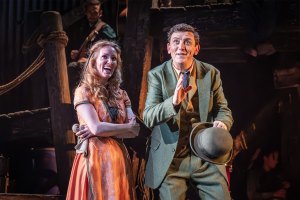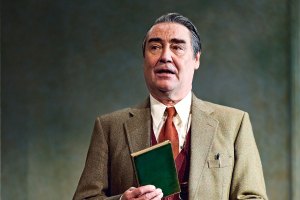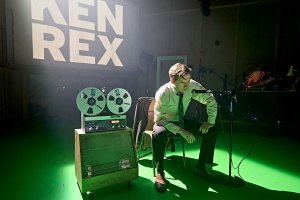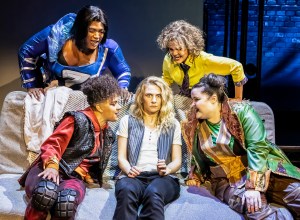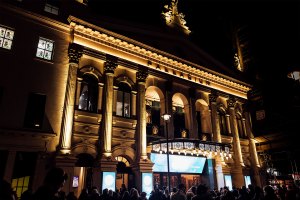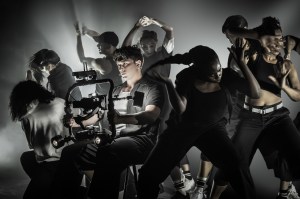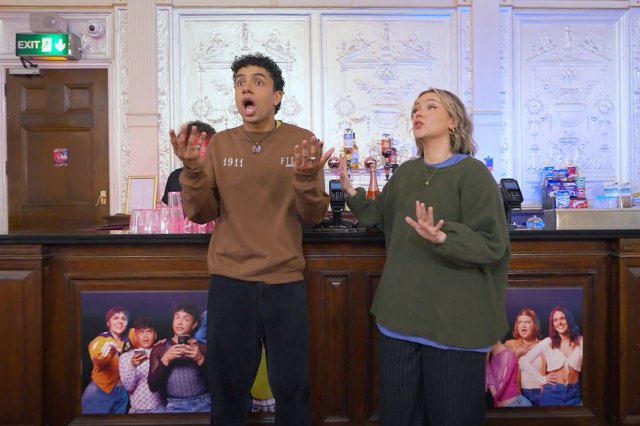Sarah Crompton's top 10 theatre shows of 2020
WhatsOnStage’s chief theatre critic picks her favourites from a challenging year
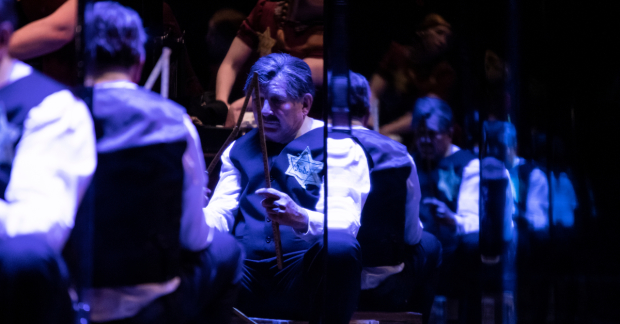
© Elias Djemil-Matassov
What a year it has been, one which has proved three things simultaneously. The first is that faced with a disaster, theatre people are inventive, resourceful, and endlessly resilient.
The second is that there is a real thirst among the public for what they do; since theatres closed across the country in March, every single flicker of activity and life, be it online or in socially-distanced spaces, has been supported, enjoyed and cheered to the rafters.
The third is that for all their fine words, and a modicum of financial support, our government doesn't quite understand either of these things. Of course, the arts aren't the first priority in a pandemic, but the theatre business, and in particular its endlessly creative and hopeful freelances, have been treated shoddily, thanks to a lack of knowledge about how theatre actually works (it was heartbreaking to see houses struggle back to life only to be instantly closed, and at some cost) and a lack of sympathy for its essential importance to the creation of a good society.
So, it's been gloomy. But there has also been much to enjoy, and in the interests of clutching at straws and offering some sparkling fairy lights amidst the gathering darkness, here, in more or less chronological order, is my theatrical top ten of 2020.
1. Uncle Vanya, Harold Pinter Theatre and film
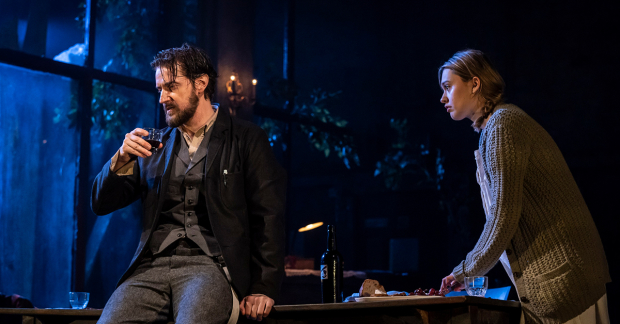
© Johan Persson
Ian Rickson's production of Chekhov, adapted by Conor McPherson, stripped it back to its emotional essence, magically reinventing it as a play of its own and every time. It featured sensational performances from the entire cast, including Toby Jones, Richard Armitage and Aimee Lou Wood, and especially Rosalind Eleazar, who made the self-centred Yelena angry rather than simply tiresome. On film, there's the added bonus of Roger Allam as her pampered husband, plus a sense that in a global pandemic time passing aimlessly, robbing people of their lives, is the most pertinent of themes. It is being shown on BBC4 on December 30, then available on iPlayer, and really is one not to miss.
2. Death of England: Michael/ Death of England: Delroy, National Theatre
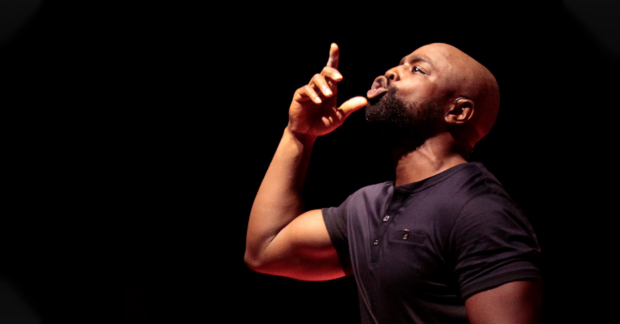
© Normski Photography
This is a bit of a cheat, two plays for the space of one, but the Death of England duology by Clint Dyer and Roy Williams would have been a highlight in any year, a diptych of visceral, boiling monologues that did as much as any plays to catch the mood of a nation where Brexit, patriotism, racism and Black Lives Matter have been as much as part of the conversation as Covid. The first play featured a swaggering performance from Rafe Spall as Michael, driven mad by the death of his father, the second a blistering one from Michael Balogun as his best friend Delroy. Both had a rare sensitivity and complexity about the lives and feelings of working-class men in
Britain today.
3. Leopoldstadt, Wyndham's Theatre
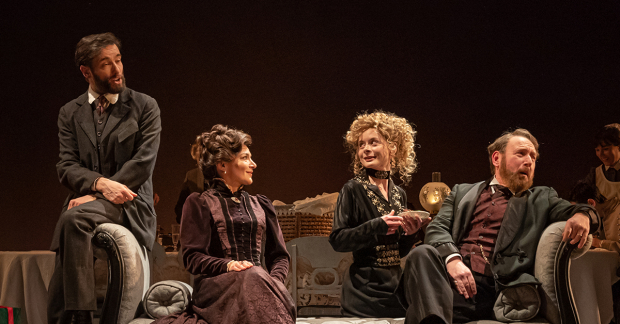
© Marc Brenner
Tom Stoppard's epic family saga was both a very personal mea culpa about his own reluctance to understand his Jewish family's tragic past and an engrossing history of the lives of the Viennese victims of the Holocaust. It was almost too sweeping in scale, introducing more than 40 characters in very quick succession and allowing time to stretch forward from 1889 to 1955, when a bustling family clan is reduced to a few lucky survivors. But its passion and the size of its heart were stunning. Structured around scenes of naming, the final one an unbearable toll of death and remembrance it is the play I have thought most about since the theatres closed, because it is essentially a plea to understand and learn from history.
4. The Seven Streams of the River Ota, National Theatre

© Elias Djemil-Matassov
The last play I saw before the world changed utterly was this masterpiece from Robert Lepage and his company Ex Machina, and if you are to run the risk of spending six hours in a room with 100s of other people just as a global pandemic is breaking, it was a work worth taking the gamble for. A wondrous tour-de-force of imagination and empathy, spanning decades, and themes as huge as the bombing of Hiroshima, the Aids epidemic and the concentration camps, it is by turns funny, insightful, challenging and incredibly moving. What I loved about it is that despite its big themes, it is really about the fallibility and lovability of human beings. Its vast canvas is full of people you come to care about and love.
5. Richard Nelson's Pandemic Apple Family Trilogy, online
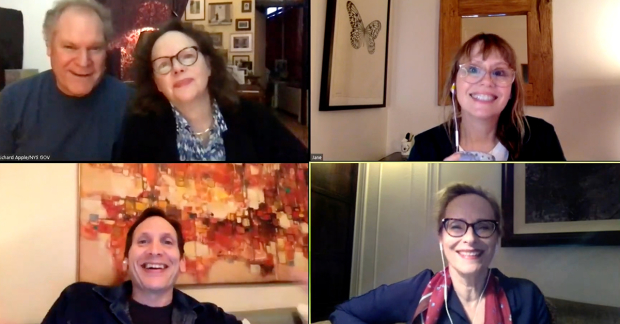
© Courtesy of the Public Theater
In three plays – What Do We Need To Talk About, And So We Come Forth, and Incidental Moments of the Day, written between May and September, Richard Nelson produced the great work of lockdown by precisely managing to capture the rhythms of life and thought that so many of us have experienced in this strange and difficult time. Working with a cast of actors who are so deeply ingrained in their roles that they seem to embody their characters, he used the medium of the Zoom family catch-up and his long-established fictional Apple family to explore the sense of people clinging to the wreckage as the world changes around them. The moment when Barbara (Maryann Plunkett) caught her breath as she remembered thinking she would die is my favourite single minute of theatrical drama this year.
6. The Three Kings, Old Vic In Camera, online
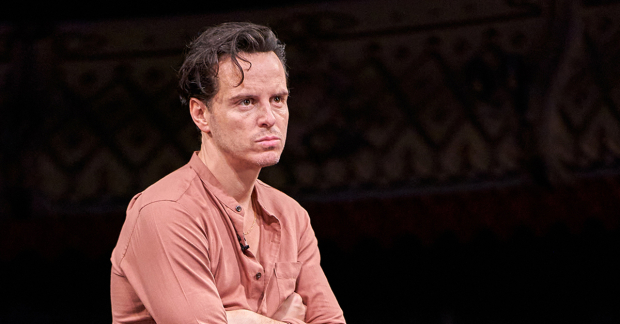
© Manuel Harlan
The Old Vic's In Camera season has successfully pioneered a new form of theatre, performed live but without an audience, and streamed digitally into people's homes. All the plays chosen have worked well, but the standout for me was Andrew Scott's searing performance in Stephen Beresford's new play about a man destroyed by his absent father, who appears in his life only to taunt him with his failures while always concealing his own. It reminded me of the late and great John Le Carré's stories about his own conman father, and the effects of lies and duplicity on a developing child. Scott brilliantly embodied every character in a riveting tour de force, proving once again that he is one of his generation's greatest actors.
7. Les Blancs, National Theatre at Home, online
One of the few bonuses of a bleak time was the National Theatre's early decision to stream a weekly play from its NT Live series to audiences at home. It gave millions of people who might rarely be able to get to the theatre a chance to relive some of the NT's greatest hits, expanding theatre's reach and its appeal. It also gave me an opportunity to catch up with Yaël Farber's production of Lorraine Hansberry's devastating play about the effects of colonialism in a fictional African country on the edge of civil war. I was knocked out by it; in the context of the Black Lives Matter protests it seemed extraordinarily timely, and the performances, particularly from Danny Sapani and Sian Phillips, were extraordinary. It made me spend more time learning about Hansberry, who died so tragically young and had so much to say.
8. Nights in the Gardens of Spain, The Bridge
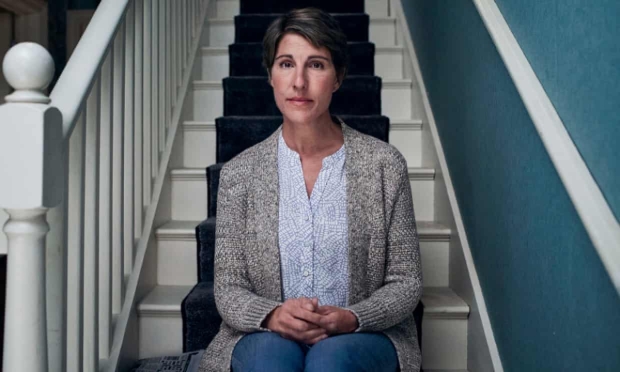
As soon as government restrictions allowed, the Bridge Theatre managed to bring in socially-distanced audiences with remarkable speed. It did so in ways that made audiences feel entirely safe, certainly safer than while in the shops. Its season of Alan Bennett's Talking Heads monologues was perfectly judged, allowing fine actors to bring these beautifully-shaped and resonant pieces to vivid life, filling the room with the absent figures conjured. Absolutely the best, as far as I was concerned, was Tamsin Greig's performance in Nights in the Gardens of Spain, directed by Marianne Elliott, in which a timid suburban housewife forms a bond with a woman who murders her husband after years of abuse. Greig's slowly developing empathy with the other woman and the tragedy of her own life was conveyed with such subtlety it was almost overwhelming.
9. Nine Lessons and Carols, Almeida Theatre
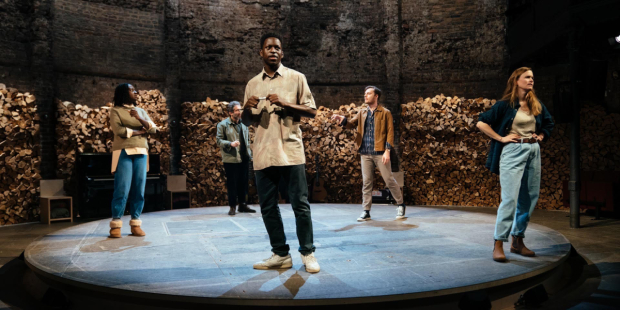
© Helen Murray
I didn't actually like this production very much so it seems strange to include it in my top ten of the year, but I was so happy to see a substantial new piece of work, devised by playwright Chris Bush, along with the cast and director Rebecca Frecknall, that I feel it deserves inclusion for its ambition. Walking into the Almeida, which has reconfigured its space even to the extent of adding little drinks holders to the backs of chairs, made me want to hug every theatre that has spent the past ten months making plans and ripping them up again as government policy changed, trying against all the odds to struggle back into the light in a pool of encroaching darkness. The play caught that mood.
10. A Christmas Carol, The Bridge
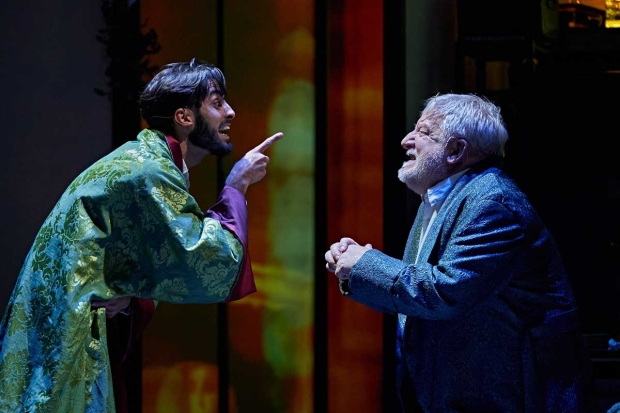
© Manuel Harlan
I've spent the last month in the company of various versions of Dickens, but this one with Simon Russell Beale as Scrooge, and Patsy Ferran and Eben Figueiredo as all the other characters, was my favourite partly because watching Russell Beale in full flow is to see a master at work, and partly because Nicholas Hytner's adaptation keeps close enough to Dickens to remind you just what made this story a perennial classic. But I mainly loved it because the directness and simplicity of the production, the use of very little to create an awful lot feels like a tribute to the power of theatre itself, its ability to conjure something out of nothing, to hold the attention with a story, to make sense of a world. It's why so many of us love theatre, and why its absence is so keenly felt.




